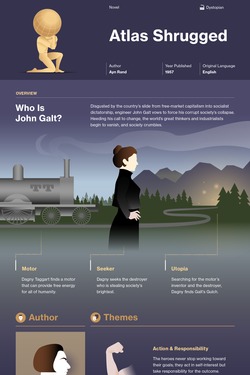
Let's discuss Atlas Shrugged. You can study the message/book here:
https://www.coursehero.com/lit/Atlas-Shrugged/
The United States economy is a "managed capitalism" with elements of socialism and communism mixed in, welfare and entitlements, subsidies for business and farmers . . . with MANY opportunities for the rich to get richer while the poor stay poor. It's a confusing mix, a mish-mash.
Is Trump's chaotic approach to government "Objectivist?" Maybe parts are, but he is generally using an eclectic, but confused mix of ideas.
Do the needy always get needier when you help them?
Again, let's discuss Atlas Shrugged. You can study the message/book here:
https://www.coursehero.com/lit/Atlas-Shrugged/
"Atlas Shrugged Theme of Philosophical Viewpoints: Objectivism. Objectivism is the name of Ayn Rand's personal philosophy, and Atlas Shrugged is basically one gigantic Objectivist manifesto. The book is all about demonstrating how Objectivist ideas can be used in daily life, and why those ideas are so important."
https://www.aynrand.org/novels/atlas-shrugged
"In 1917, Bolsheviks under Lenin seized control of Russia in the famous October revolution, ending a short-lived experiment with constitutional democracy and replacing it with a one-Party socialist state. As the revolution swirled through the streets of St. Petersberg, a girl of 12 watched many of the events from the balcony of her family’s house. That girl was Alyssa Rosenbaum, who ultimately left Russia for America and became the writer we know as Ayn Rand .In 1957, she published her final and greatest novel, Atlas Shrugged , the book we celebrate today on its 50th anniversary.
Atlas Shrugged is a revolutionary work, but the revolution it represents is diametrically opposed to the one she lived through as a youth. In the eight years before she left the Soviet Union in 1925, Rand lived through the economic chaos and desperate poverty it caused, as the communists nationalized businesses and expropriated private wealth. Her father was a pharmacist, and Rand was in the shop when soldiers arrived to close the business and seize the property, depriving the family of work, property, and income. In the years before she left, she lived through the tyranny of statism, as the communists used every means to expand their power—including secret police, terror tactics, and executing enemies or shipping them to Siberia. Under the new communist regime, more and more of private life was politicized, including speech, ideas, and education."
The lady was focused on individuals taking care of themselves when she saw how corrupt governments took away freedom for their benefit. Government's best work is to get out of the way!
" . . . Atlas is her fullest and deepest portrayal of the issues involved. It goes far beyond the specifics of any particular type of system—communist, fascist, communitarian, whatever—to deal with the essence of collectivism.
And, more importantly, to present the essence of individualism, including the capitalism system of economic freedom. What she meant by capitalism is not the mixed economy characteristic of all the industrialized countries, in which the government consumes a third or more of all production, and heavily regulates the rest. She meant laissez-faire, “with a separation of state and economics, in the same way and for the same reasons as the separation of state and church." The function of government is solely to protect individual rights, including property rights. When it redistributes wealth, nationalizes industries, or regulates voluntary transactions among consenting adults, it commits the moral fallacy of socialism, the fallacy of treating the individual as a means to the collective good."
What is the "Objectivist manifesto?"
"Atlas Shrugged, Ayn Rand’s last novel, is a dramatization of her unique vision of existence and of man’s highest potential. Twelve years in the writing, it is her masterwork.
Is the pursuit of profit a noble enterprise or the root of all evil? Is sexual passion an exalted spiritual virtue or a dirty, animalistic vice? Is reason an absolute or is faith an alternative source of truth? Is self-esteem possible or are we consigned to a life of self-doubt and guilt? In what kind of society can an individual prosper, and in what kind of society is he doomed to the opposite fate?
Rand’s worldview emerges in the compelling plot turns of a mystery story, centered on the question “Who is John Galt?”"
